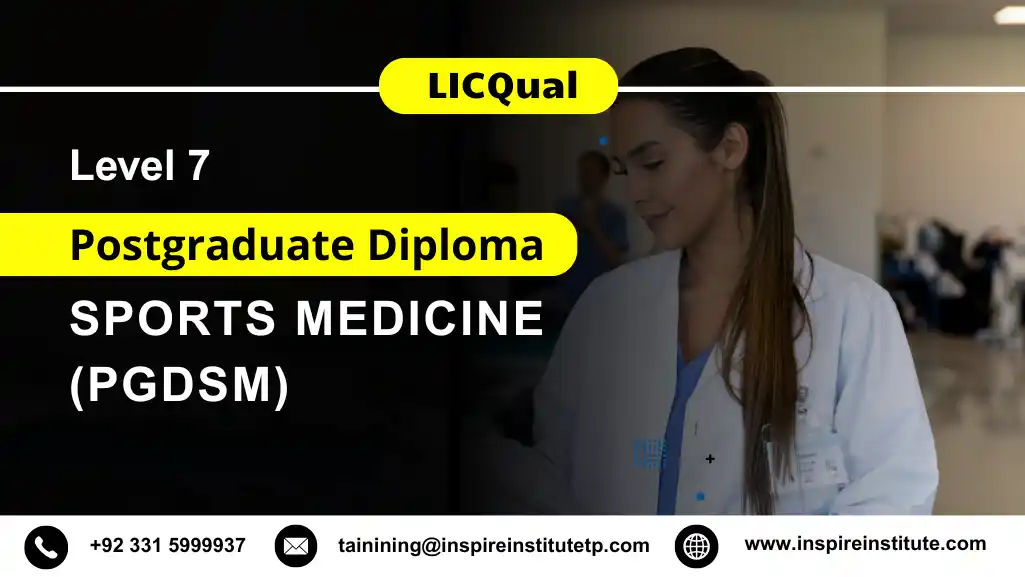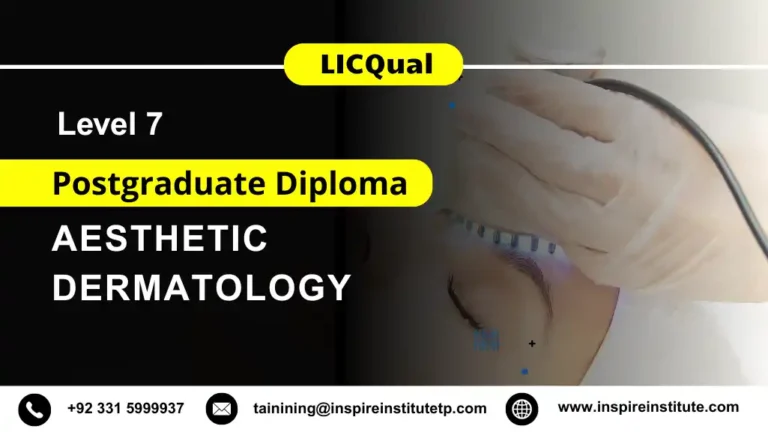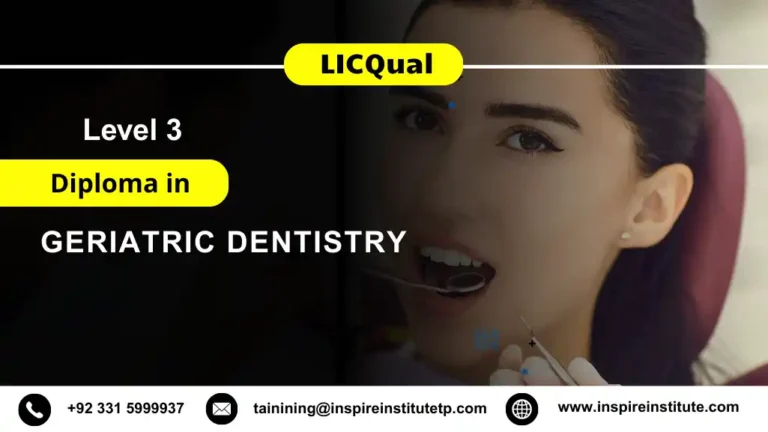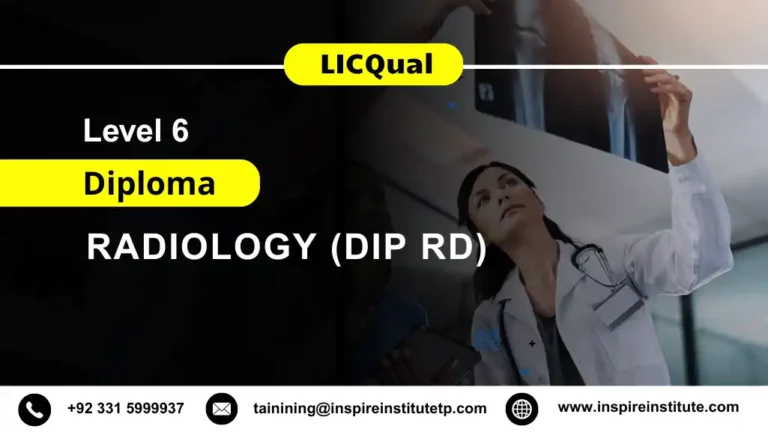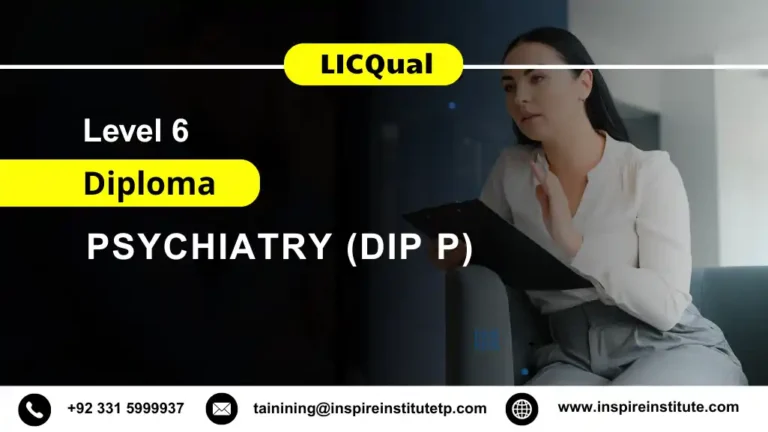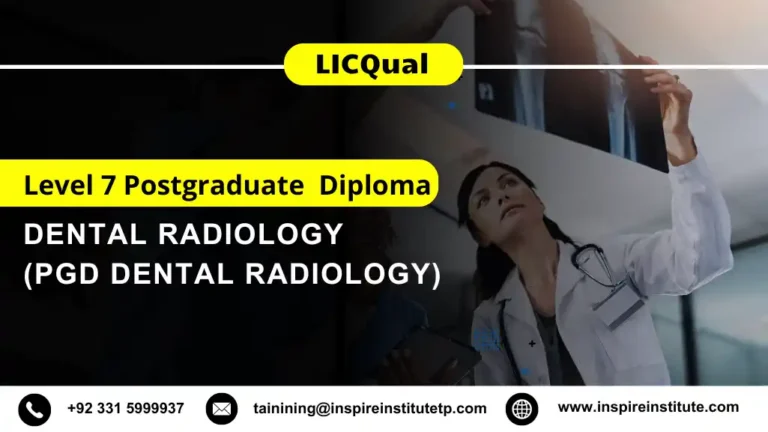LICQual Level 7 Postgraduate Diploma in Sports Medicine (PgDSM)
The LICQual Level 7 Postgraduate Diploma in Sports Medicine (PgDSM) is a UK-accredited qualification designed for healthcare professionals, sports therapists, physiotherapists, and medical practitioners seeking advanced expertise in the prevention, diagnosis, and management of sports-related injuries. Sports medicine is an evolving and highly specialized field that combines clinical knowledge with practical application, making it essential for professionals aiming to enhance athletic performance and ensure optimal health outcomes.
This assignment-based postgraduate diploma equips learners with a comprehensive understanding of sports physiology, biomechanics, injury mechanisms, and rehabilitation strategies. By integrating evidence-based practice with clinical application, the programme prepares professionals to assess athletes, develop individualized treatment plans, and implement interventions that promote recovery and performance improvement. Learners also gain insight into sports nutrition, exercise physiology, and performance monitoring techniques.
The PgDSM programme focuses on developing practical skills that are directly applicable to real-world sports and clinical environments. Through case studies, scenario-based learning, and applied assignments, learners strengthen their ability to evaluate musculoskeletal injuries, implement rehabilitation protocols, and provide multidisciplinary care in collaboration with coaches, physiotherapists, and medical teams.
Why Choose this Qualification
The LICQual Level 7 Postgraduate Diploma in Sports Medicine (PgDSM) is a leading UK-accredited qualification designed for healthcare professionals, physiotherapists, sports therapists, and clinicians who want to elevate their expertise in sports medicine, injury management, and athlete care. This assignment-based diploma combines theoretical knowledge with practical application, equipping learners with the skills, confidence, and professional credibility required to excel in the rapidly growing field of sports medicine.
Key Reasons to Choose this Qualification
Specialist Knowledge
- Gain advanced understanding of sports physiology, anatomy, and biomechanics.
- Explore mechanisms and prevention strategies for musculoskeletal injuries.
- Develop expertise in exercise physiology, sports nutrition, and performance monitoring.
- Learn evidence-based approaches to athletic injury management and rehabilitation.
- Understand principles of high-performance training and sports psychology for athletes.
Practical Application
- Develop hands-on skills through case studies, clinical simulations, and applied research.
- Learn to assess, diagnose, and manage sports injuries across diverse populations.
- Implement individualized rehabilitation protocols and performance enhancement plans.
- Collaborate effectively within multidisciplinary teams, including coaches and physiotherapists.
- Gain practical experience in designing preventive strategies for sports-related injuries.
Recognised Qualification
- Earn a UK-accredited Level 7 Postgraduate Diploma in Sports Medicine (PgDSM).
- Obtain internationally recognised credentials that enhance career opportunities.
- Demonstrate professional competency in advanced sports medicine practice.
- Validate expertise for roles in sports clinics, athletic organisations, and healthcare institutions.
- Enhance credibility for academic, research, and leadership positions.
Flexible Learning Pathway
- Study at your own pace with assignment-based learning suitable for working professionals.
- Access digital learning resources, structured guidance, and expert mentorship.
- Balance career responsibilities while advancing academic qualifications.
- Progress through the course without disrupting professional or athletic commitments.
- Benefit from a flexible schedule that accommodates global learners.
Evidence-Based Training
- Engage with the latest research, clinical guidelines, and sports medicine innovations.
- Learn to critically appraise scientific literature and integrate findings into practice.
- Develop evidence-based strategies for injury prevention and rehabilitation.
- Apply validated diagnostic and treatment methods in clinical and sports settings.
- Stay updated with global best practices in sports medicine care.
Career Development
- Open diverse career paths in sports medicine, physiotherapy, athletic organisations, and research institutions.
- Prepare for senior roles such as Sports Medicine Specialist, Athletic Clinician, or Rehabilitation Consultant.
- Access opportunities in academia, research, and consultancy roles.
- Establish a foundation for doctoral-level studies or advanced fellowship training.
- Strengthen employability in both professional sports and healthcare sectors.
Enhanced Patient & Athlete Impact
- Deliver ethical, patient-centered, and athlete-focused care.
- Implement preventive strategies to reduce injury risk and enhance performance.
- Support rehabilitation for optimal recovery and long-term health.
- Educate athletes and patients on safe exercise practices and lifestyle strategies.
- Improve overall patient outcomes and satisfaction in clinical and sports settings.
Professional Growth
- Strengthen leadership, communication, and clinical decision-making skills.
- Foster reflective practice, innovation, and teamwork within multidisciplinary teams.
- Develop strategic thinking for managing complex sports medicine cases.
- Enhance research skills for continuous professional development.
- Position yourself as a leader and influencer in sports medicine globally.
The LICQual Level 7 Postgraduate Diploma in Sports Medicine (PgDSM) provides healthcare and sports professionals with the advanced knowledge, practical skills, and internationally recognised credentials required to excel in the field. Choosing this qualification ensures measurable professional growth, improved athlete care, and a strong foundation for career advancement in sports medicine.of urology. It offers a measurable impact on professional development, clinical competence, and healthcare excellence globally.
Course Overview
LICQual UK Awarding Body
Average Completion Time:
6-24 Months
Study Units: 6 Units
Evidence & Assignment Based
Mandatory Units
Who Should Take This Course
The LICQual Level 7 Postgraduate Diploma in Sports Medicine (PgDSM) is designed for healthcare professionals, clinicians, and sports specialists who wish to deepen their expertise in the prevention, diagnosis, management, and rehabilitation of sports-related injuries. This assignment-based programme provides a flexible learning pathway to gain advanced skills, evidence-based knowledge, and practical applications that are directly relevant to clinical, athletic, and research settings. The course is ideal for professionals aiming to enhance their career prospects, improve patient and athlete outcomes, and establish leadership in sports medicine.
This course is suitable for
Medical Doctors and Physicians
- Gain advanced knowledge in sports injury diagnosis and management.
- Develop practical skills in musculoskeletal assessment and rehabilitation.
- Apply evidence-based strategies to improve athlete care and recovery.
- Enhance clinical decision-making for sports and exercise-related conditions.
- Build credentials for senior roles in sports medicine clinics or hospitals.
Physiotherapists and Sports Therapists
- Learn to design individualized rehabilitation and injury prevention programs.
- Apply biomechanics and exercise physiology principles in real-world settings.
- Strengthen patient and athlete assessment skills using evidence-based protocols.
- Collaborate effectively within multidisciplinary sports medicine teams.
- Improve professional recognition and career opportunities in sports therapy.
Nurses and Allied Health Professionals
- Gain expertise in sports injury management and athlete care planning.
- Develop practical knowledge of recovery protocols and preventive strategies.
- Enhance communication skills for working with athletes, coaches, and medical teams.
- Strengthen leadership and coordination capabilities in clinical and sports environments.
- Build professional credibility for roles in sports and rehabilitation centres.
Sports Coaches and Athletic Trainers
- Understand advanced principles of exercise physiology, sports performance, and injury prevention.
- Learn to integrate medical advice into training programs safely.
- Apply assessment tools to monitor athlete health and optimize performance.
- Enhance skills in supporting rehabilitation and safe return-to-play protocols.
- Improve decision-making and communication with healthcare professionals.
Researchers and Academics in Sports Science
- Gain comprehensive understanding of sports medicine research methods and evidence-based practice.
- Develop skills to critically appraise scientific literature.
- Apply advanced knowledge in designing clinical or performance-based studies.
- Contribute to innovations in sports injury prevention and rehabilitation.
- Strengthen credentials for academic and research positions in sports medicine.
Fitness and Exercise Professionals
- Learn to identify and manage common sports injuries in clients.
- Gain knowledge of exercise programming, performance enhancement, and risk reduction.
- Apply rehabilitation and preventive strategies safely in fitness settings.
- Enhance expertise in athlete monitoring and functional assessments.
- Improve career prospects in gyms, rehabilitation centres, or elite sports environments.
International Healthcare Professionals
- Align international experience with UK and global sports medicine standards.
- Gain advanced knowledge applicable across diverse healthcare systems.
- Enhance skills in multidisciplinary collaboration and patient-centred care.
- Access global career opportunities in hospitals, sports clinics, and research institutions.
- Build recognition for professional qualifications internationally.
Career Changers Seeking Specialization in Sports Medicine
- Acquire advanced theoretical and practical knowledge for entering the field.
- Develop competence in injury management, rehabilitation, and performance optimization.
- Gain professional credibility and internationally recognised credentials.
- Build networks with healthcare professionals, researchers, and sports organizations.
- Open pathways for career progression in sports medicine and allied healthcare.
The LICQual Level 7 Postgraduate Diploma in Sports Medicine (PgDSM) is ideal for professionals and aspiring specialists who want to advance their careers, enhance their clinical skills, and contribute meaningfully to athlete care and sports performance. This programme provides measurable expertise and practical experience, preparing graduates to excel in diverse professional and clinical environments globally.
Course Benefits
The LICQual Level 7 Postgraduate Diploma in Sports Medicine (PgDSM) is a UK-accredited qualification designed for healthcare professionals, physiotherapists, sports therapists, and medical practitioners who aim to advance their expertise in preventing, diagnosing, and managing sports-related injuries. This assignment-based postgraduate diploma integrates theoretical knowledge with practical applications, preparing learners to design, implement, and evaluate effective sports medicine programs. Through evidence-based learning and flexible study pathways, this qualification equips professionals to enhance athlete performance, reduce injury risks, and contribute to advancements in sports healthcare.
Key Benefits of the Course
- Specialist Knowledge:
Learners gain an in-depth understanding of sports physiology, anatomy, and biomechanics. The course explores essential topics including musculoskeletal injuries, sports-related trauma, exercise physiology, and performance optimization strategies. Learners also study sports nutrition, rehabilitation techniques, and preventive medicine, ensuring they can develop comprehensive plans for injury prevention, athlete assessment, and performance enhancement. This strong theoretical foundation prepares graduates to apply knowledge confidently in diverse sports and clinical settings. - Practical Application:
The PgDSM focuses on developing practical skills through case studies, clinical simulations, and research-based assignments. Learners enhance their ability to assess athletes, diagnose injuries, design rehabilitation programs, and implement interventions that improve performance and recovery. The programme emphasizes real-world application, multidisciplinary collaboration, and evidence-based approaches, preparing professionals to manage complex sports medicine cases with precision and confidence. - Recognised Qualification:
Upon completion, learners earn a prestigious UK-accredited Level 7 Postgraduate Diploma in Sports Medicine (PgDSM). This internationally recognised qualification validates professional competence and expertise, enhancing credibility in sports medicine clinics, rehabilitation centres, hospitals, and athletic organisations. Graduates are well-positioned for career advancement, academic roles, and leadership opportunities in global sports and healthcare sectors. - Flexible Learning Pathway:
Designed for busy professionals, the assignment-based programme allows learners to study at their own pace without disrupting their careers. Learners gain access to comprehensive online learning resources, structured academic guidance, and personalised mentorship. This flexible approach enables professionals to balance continuing education with ongoing clinical practice or work in athletic settings. - Evidence-Based Training:
Learners engage with the latest research, clinical guidelines, and sports medicine innovations. The course develops the ability to critically evaluate scientific literature, integrate validated practices, and implement evidence-based injury prevention and rehabilitation strategies. Graduates are trained to adopt a data-driven approach to enhancing athlete safety, recovery outcomes, and overall performance. - Career Development:
This qualification opens diverse career opportunities in sports medicine, physiotherapy, rehabilitation centres, athletic organisations, and academic institutions. Graduates may pursue roles such as Sports Medicine Specialist, Athletic Clinician, Rehabilitation Consultant, or Research Fellow. The PgDSM also provides a strong foundation for doctoral-level studies or fellowship training in advanced sports medicine or performance science. - Enhanced Athlete Impact:
Graduates develop the expertise to deliver ethical, patient-centred, and athlete-focused care. The course builds competence in injury prevention, rehabilitation management, and performance optimisation. Professionals gain the ability to improve recovery times, reduce re-injury risk, and enhance athlete well-being, making a meaningful impact on individual athletes and sports teams. - Professional Growth:
The PgDSM strengthens critical professional skills including clinical decision-making, leadership, teamwork, and communication. Graduates are encouraged to adopt reflective practice, innovation, and evidence-informed strategies. The programme empowers professionals to take leadership roles, contribute to research, and elevate standards in sports medicine globally.
The LICQual Level 7 Postgraduate Diploma in Sports Medicine (PgDSM) empowers healthcare and sports professionals to become leaders in sports medicine through advanced knowledge, practical expertise, and internationally recognised credentials. It enhances career prospects while driving excellence in athlete care, injury management, and performance optimisation worldwide.
Eligibility Criteria
The LICQual Level 7 Postgraduate Diploma in Sports Medicine (PgDSM) is a UK-accredited qualification designed for healthcare professionals, sports therapists, physiotherapists, and medical practitioners who aim to advance their expertise in athlete care, sports injury management, and performance optimisation. This assignment-based postgraduate diploma combines theoretical foundations with practical applications, preparing learners to assess, plan, implement, and evaluate effective sports medicine programs.
Educational Background:
Applicants should hold a recognised qualification in medicine, physiotherapy, sports science, healthcare, or a related field. A Level 6 diploma or equivalent qualification in clinical sciences, rehabilitation, or allied health disciplines may also be accepted. Candidates with international degrees in medicine, physiotherapy, sports science, or allied health will be assessed individually to determine eligibility and equivalence to UK standards.
Professional Experience:
A minimum of one year of experience in healthcare, clinical practice, sports medicine, physiotherapy, or a related medical field is recommended. Previous exposure to athlete care, injury management, rehabilitation, or clinical assessment provides an advantage. Motivated applicants with a strong interest in sports performance, injury prevention, or rehabilitation, even without direct professional experience, are encouraged to apply.
Age Requirement:
Applicants must be at least 18 years old at the time of enrolment. This ensures learners possess the maturity, professional responsibility, and ethical understanding necessary for advanced study and practical application in sports medicine.
Language Proficiency:
As the programme is delivered entirely in English, learners must demonstrate proficiency in reading, writing, and communication. A minimum IELTS score of 6.0 or an equivalent qualification is recommended for non-native English speakers to ensure effective participation in assignments, discussions, and assessments.
Technical Requirements:
Learners should have access to a computer or laptop with a reliable internet connection to participate in online learning, access study materials, and submit assignments. Basic computer literacy, including skills in research, data analysis, document preparation, and communication tools, is essential for academic success in this programme.
Required Documents:
Applicants are required to submit the following documents during registration:
A valid ID card or passport for identity verification.
Academic transcripts or certificates of previous qualifications.
Proof of professional experience in healthcare, sports medicine, physiotherapy, or allied health (if applicable).
The Qualification Process
LICQual Level 7 Postgraduate Diploma in Sports Medicine (PgDSM) follows a structured pathway to ensure learners gain comprehensive knowledge, practical skills, and professional competence in community oral healthcare.
Step 1: Self-Assessment
Learners review the entry requirements to confirm eligibility. Candidates with a background in dentistry, oral health, or public health are encouraged to apply.
Step 2: Registration
Complete the registration process by submitting required documents such as proof of qualifications, a valid ID, and payment of enrollment fees.
Step 3: Induction
An induction session is conducted to:
- Verify learner eligibility and documentation.
- Introduce study materials, learning outcomes, and assessment procedures.
Step 4: Learning and Evidence Submission
Learners complete assignments, case studies, and practical exercises demonstrating competence in public health dentistry, community oral health assessment, preventive strategies, and program planning.
Step 5: Feedback and Revision
Assessors review submitted evidence and provide constructive feedback. Learners can revise and resubmit work to meet all required standards.
Step 6: Competence Validation
Final submissions are evaluated to confirm that learners have met all theoretical and practical learning outcomes.
Step 7: Internal Quality Assurance (IQA)
The IQA team reviews the assessment process to ensure accuracy, fairness, and compliance with international standards.
Step 8: External Verification (EQA)
External verifiers validate the authenticity and quality of learner achievements.
Step 9: Certification
Upon successful verification, learners are awarded LICQual Level 7 Postgraduate Diploma in Sports Medicine (PgDSM), demonstrating advanced proficiency in community oral healthcare and preparing them for professional growth in dental public health, preventive dentistry, and healthcare policy.

